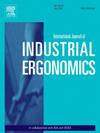个体人工智能熟练程度对人类智能体协作的影响:对于人工智能熟练程度较高的用户,识别智能体理解能力的敏感度更高
IF 3
2区 工程技术
Q2 ENGINEERING, INDUSTRIAL
International Journal of Industrial Ergonomics
Pub Date : 2025-04-16
DOI:10.1016/j.ergon.2025.103745
引用次数: 0
摘要
本研究从人- agent协作的角度探讨了个体人工智能(AI)熟练程度对任务得分、人类对agent智能和拟人化的感知、信任和心理工作量的影响。在参与者和智能代理合作导航未知地图的任务中,实施了2(个体人工智能熟练度,受试者之间)x2(智能代理对人类意图的理解能力,受试者内部)混合实验设计。40名参与者参加了这项研究。结果表明,人工智能熟练程度和智能体理解能力对人类信任、感知智能和感知拟人化有显著的交互作用。与仅基于即时反馈的智能代理相比,人工智能熟练程度较高的用户在与基于即时和先前反馈解释人类意图的智能代理交互时表现出更高的信任、感知智能和拟人化,对代理能力的变化表现出更高的敏感性。此外,与仅依赖即时反馈的智能代理相比,基于即时和先前的反馈来解释人类意图的智能代理显着减少了用户的心理工作量。本文章由计算机程序翻译,如有差异,请以英文原文为准。
The impact of individual AI proficiency on human–agent collaboration: Higher sensitivity to discern the comprehension ability of intelligent agents for users with higher AI proficiency levels
This study explored the impact of individual artificial intelligence (AI) proficiency on task scores, human perceptions of the agent's intelligence and anthropomorphism, trust, and mental workload from the perspective of human–agent collaboration. A 2 (Individual AI Proficiency, between-subjects) 2 (Intelligent Agent's Comprehension Ability for Human Intentions, within-subjects) mixed experimental design was implemented in a task in which the participants and intelligent agents collaborated to navigate an unknown map. Forty participants participated in this study. The results revealed significant interaction effects between human AI proficiency and the agents' comprehension abilities on human trust, perceived intelligence, and perceived anthropomorphism. Users with higher AI proficiency demonstrated greater trust, perceived intelligence, and anthropomorphism when interacting with intelligent agents that interpreted human intention based on both immediate and previous feedback, compared to intelligent agents based solely on immediate feedback, displaying a higher sensitivity to the change in agents' ability. Additionally, intelligent agents that interpret human intentions based on both immediate and previous feedback significantly reduce users' mental workload compared with those that rely solely on immediate feedback.
求助全文
通过发布文献求助,成功后即可免费获取论文全文。
去求助
来源期刊
CiteScore
6.40
自引率
12.90%
发文量
110
审稿时长
56 days
期刊介绍:
The journal publishes original contributions that add to our understanding of the role of humans in today systems and the interactions thereof with various system components. The journal typically covers the following areas: industrial and occupational ergonomics, design of systems, tools and equipment, human performance measurement and modeling, human productivity, humans in technologically complex systems, and safety. The focus of the articles includes basic theoretical advances, applications, case studies, new methodologies and procedures; and empirical studies.

 求助内容:
求助内容: 应助结果提醒方式:
应助结果提醒方式:


